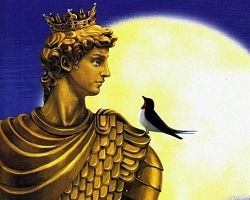The Tales of Oscar Wilde
Oscar Wilde wrote his tales through the view of the world with a
cynical eye. Wilde critiqued European society in the late 1800's heavily in his three of his tales: "The Selfish Giant," "The Happy Prince," and "The Nightingale and the Rose." Furthermore, each of Wilde's stories end with
death or
destruction, which
criticizes the ideal happy ending that most fairy tales employ.
In "The Selfish Giant," Wilde alludes to the very
Christian idea that one's selfless actions on earth will lead to their
redemption and invitation into '
Paradise.' The heavy-handed representation of Jesus in the form of the little boy who was climbing the tree was a perfect example of Wilde's declaration of being "as artificial as possible" (Tatar 326) in his writing.
In the tale "The Happy Prince,"Oscar Wilde
criticizes the government at the time, referring to it as "the Corporation" (Tatar 341). Here he suggests the corruption of the ruling party as the Mayor and the Town Councillors bicker over who should be commemorated in the place of the Happy Prince's statue.
Also, Wilde provides a
social critique: the townspeople look up the the statue that towers above them at the highest point in the city and admire it, some are even jealous of the prince's happiness. However, only the reader and the sparrow know the truth of the prince's pain and captivity. This reminds me of
social media in the world today. Some people post photos of their beautiful vacations and they are smiling and laughing, but that was
only a single moment captured in time. Just like the
fixed statue, posts on Facebook or Instagram can be
manipulated into a happy depiction, even if it was painful.
"The Nightingale and the Rose" paints a vivid picture of the
follies of love and ignorance. While the
nightingale represented
true love, the
student and the
girl were mere
materialistic, above-the-surface versions of love. This tale highlighted
sacrifice, and ended horrifically with the nightingale dying in vain.




Comments
Post a Comment